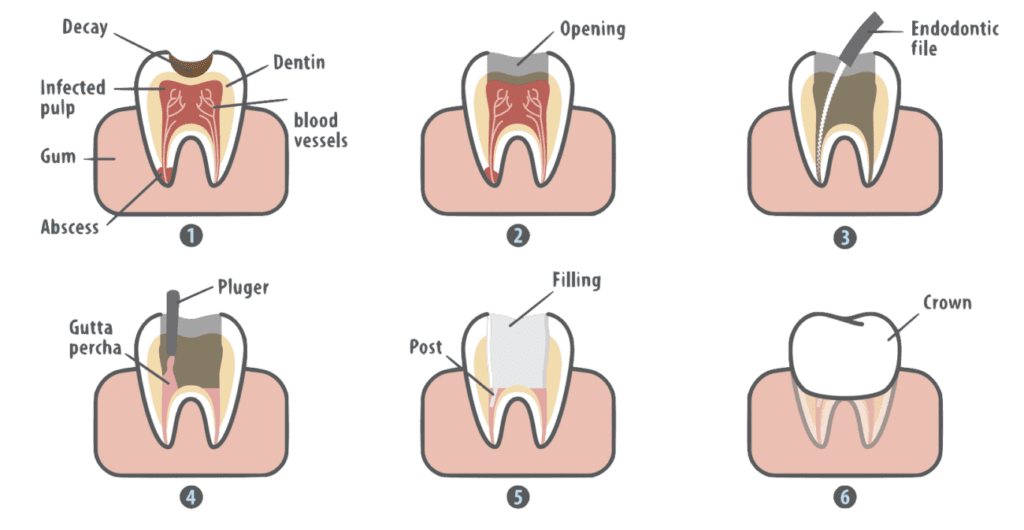Gentle Wave®: An Alternative to Root Canal Therapy

The Claremont Dental Institute offers state-of-the-art dental care and aims to give you the best experience possible. Dr. Steve Fountain and our team use the GentleWave® procedure as a modern alternative to traditional root canals.
GentleWave® uses water and sound waves to clean deep inside the tooth’s root, removing decay and bacteria. This method is more thorough, less invasive, and can provide better long-term results. The benefits of GentleWave® include:
- Less invasive: It disturbs less of your natural tooth, which helps the tooth stay strong after treatment.
- Only takes one visit: We can complete most treatments in just one visit, so you don’t need to come back for a follow-up.
Do You Need A Root Canal?
If you have a root canal infection, it can affect the health of your smile. Untreated decay can spread to the inner part of the tooth. When the inner pulp of the tooth gets infected, you may need a root canal to fix it. This procedure can also help if the tooth has been injured and causing pain.
If you have ongoing pain or discomfort in your mouth, visit Claremont Dental Institute as soon as possible. Addressing a root canal infection quickly can help avoid the need for tooth extraction.
Symptoms of A Root Canal Infection
- Sharp or shooting pain
- Swollen gums
- Dark spots on teeth
Root canals are often thought to be very painful, but the pain actually comes from the infection, not the procedure itself. Most patients feel relief from their symptoms after the treatment. We take great care to ensure you feel safe and comfortable during the procedure.
If you think you might need a root canal, contact our Claremont, CA office. We will carefully examine your teeth and take digital x-rays to see if a root canal is necessary. Our dentists aim to offer the best, least invasive treatments for long-term oral health.
We also offer sedation options for those who feel anxious about dental visits. If you have dental anxiety, let us know, and we can help make your visit more comfortable.

What to Expect: Root Canal Therapy
If you need a root canal, your dentist will first make sure you’re as comfortable as possible. They will give you a local anesthetic to numb the area where they’ll work. Once you’re comfortable and relaxed, the procedure will start.
Your dentist will make a small opening in your tooth to reach the inside. They will use a special tool to remove the infected tissue and any debris inside the tooth.
After removing the infected pulp, the pain will go away. Then the dentist will clean and prepare the tooth for a filling material called gutta-percha, which helps prevent future decay.
Your dentist will take digital images or molds of your tooth to make a custom crown. This crown will fit perfectly over the treated tooth, helping to stabilize your bite.
Root Canal Aftercare and Recovery
Taking care of your tooth after a root canal is important for a smooth recovery and to ensure the procedure works well in the long term. Here are some tips to follow after root canal therapy:
- Follow Instructions: We will give you specific care instructions. These will be different for each patient and may include how to manage pain and take any prescribed medicine.
- Avoid Chewing on the Treated Tooth: Don’t chew on the tooth until we place a crown or a permanent filling to avoid damaging it. The tooth will be sensitive to hot and cold foods and drinks.
- Brush and Floss: Brush your teeth twice a day and floss daily. Be gentle around the treated tooth to avoid irritation.
- Avoid Smoking and Alcohol: Smoking and drinking alcohol can slow healing. Try to avoid them for at least 48 hours after the procedure.
Root Canal FAQs
Root canals are an important part of keeping your teeth healthy. Many people are nervous about them, so we encourage you to ask as many questions as you need. Check out our FAQs about root canals and contact our office if you need more information.
Does a root canal hurt?
Many people think root canals are very painful. In reality, most of the pain comes from the problem the root canal is fixing, not the procedure itself. At Claremont Dental Institute, we make sure your visit is as comfortable as possible.
Is an extraction better than a root canal?
It’s usually better to save your natural tooth if you can. If we can save your tooth, we will suggest a root canal. This option is better for your oral health and avoids the cost of replacing the tooth.
However, if your tooth is too damaged or decayed, the dentist might need to remove it. Your dentist will help you decide what’s best during your visit.
Will dental insurance cover a root canal?
A root canal is usually covered in part by dental insurance, as it is a necessary procedure. However, how much your insurance covers can vary. Check with your insurance provider to discover what they will pay and what you might need to cover yourself.
What is gutta-percha?
Gutta-percha is a material used to fill and seal the inside of a tooth after a root canal. It consist of plant latex and is safe for use in the body. The compound keeps bacteria out and keeps the tooth from getting reinfected.
Can I be put under anesthesia for a root canal?
Yes, there are different types of anesthesia for root canals. Some make you completely asleep, while others just help you stay calm but keep you awake. Talk to your dentist about which type of anesthesia is best for you and your procedure.
Do I need a crown after a root canal?
Crowns help protect and strengthen the tooth after a root canal. While not always necessary, every tooth that gets a root canal usually needs a crown to be strong enough for normal use, like eating and brushing.
Schedule an appointment today with Claremont Dental Institute by calling (909) 277-6919 or request an appointment online. One of our expert dentists will check your tooth to see if a root canal is the right treatment for you.
